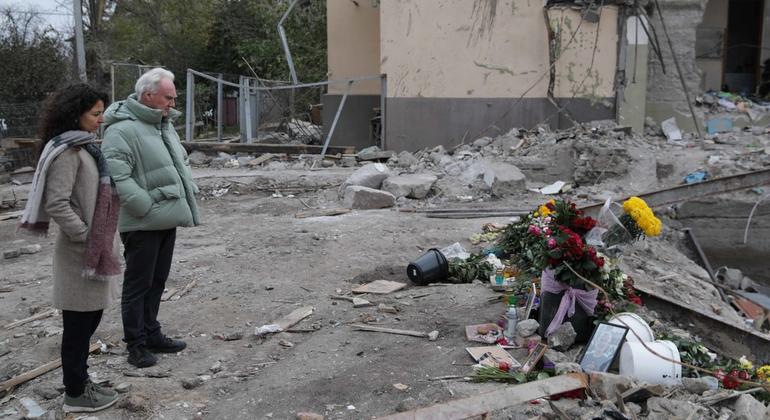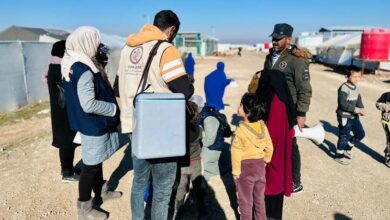RC Blog: ‘It will take years to help people deal with the invisible consequences of war’

“I am constantly inspired by the strength and courage of the Ukrainian people. When I visited Kharkiv, Kherson, Mykolaiv, Sumy, Zaporizhzhia and most recently Kramatorsk and Lyman, I witnessed firsthand how disruptions to essential services such as electricity, water and heating affect children. what kind of person.
I spoke to people whose loved ones were killed and whose homes were destroyed in the attacks. I met people at transit points who had to leave their lives behind to carry whatever belongings they could salvage in a small bag. Every day, they show extraordinary determination – not only to get up and continue with their lives, but also to help others.
The Ukrainian government and local authorities are doing an impressive job responding immediately to the attacks so that those willing to return can do so as quickly as possible. One of the governors told me that after an attack that damaged 13 buildings, they, along with partners, managed to seal all the windows and reconnect water, electricity and heating so that every person can return home within four days.

People are receiving psychological support after a missile attack damaged many homes across Ukraine.
‘Widespread trauma and psychological suffering’
I have a feeling that this long war has led to widespread psychological trauma. The need for mental health support is obvious and It will take years to help people deal with the invisible consequences of war.
On the other hand, I see people starting to rebuild as soon as possible, whether it’s their business, home or life. The future begins as soon as the sirens stop. I have seen many people return to rebuilt homes or enter new homes with tears of relief. People don’t want to leave; they want to stay in their community. And of course, everyone I spoke to wanted the war to end, although many emphasized that this could not come at the cost of not regaining and maintaining their territorial integrity.
And I want to reiterate the Secretary-General’s message about the need for justice and peace in Ukraine in accordance with the agreement. UN Charterinternational law and General Assembly resolutions.
The United Nations in Ukraine stands ready to continue providing lifesaving assistance. In parallel, we will continue to pursue medium- and long-term solutions to help affected individuals and communities rebuild and reduce their dependence on external aid. I can only hope that our determination to support the Ukrainian people as long as they need us will provide some hope for a more dignified future.

Signs in Ukraine warn about landmines.
Rebuild the country
Needless to say, the destruction of essential services poses major challenges to the country’s economy and development. Education and healthcare systems are under immense pressure, compounded by growing mental health challenges as people face isolation, frozen homes and the stress of life. war is going on.
The Russian Federation’s intentional and systematic targeting of Ukraine’s energy infrastructure is a serious violation of international humanitarian law, causing widespread and foreseeable harm to civilians..
United Nations Development Program (UNDP) estimates that more than 60% of power generation facilities have been damaged since 2022. Winter is here, it is urgent that the escalating energy crisis is addressed and we must work together to support the people of Ukraine during this critical time. Of course, restoring access to energy is vital to ensure that essential services operate and that no one is left behind.
UN agencies are helping communities clear debris and landmines, repair homes, schools and hospitals, build new social infrastructure, and provide basic services. , mental health and psychosocial care, and supporting livelihoods and employment – all are priority issues for people. Government. The question is how to scale the effort because demand is so high.
Ten million Ukrainians were displaced. Of these, 3.5 million are being received in communities across the country. Many of them lost their livelihoods; they need homes and places to work, they need schools and kindergartens to take children to the hospital.

UNICEF has begun distributing winter clothes to families in the eastern region of Ukraine.
Planning for Ukraine’s future
Humanitarian organizations have established emergency response mechanisms to the growing and escalating needs across the country. We have proven our versatility and impact time and time again and will continue to do so.
While humanitarian assistance must continue at a scale sufficient to support the most vulnerable, recovery efforts must be pursued and scaled up to deliver medium-term and sustainable solutions more for the most affected communities and populations. These require significant and stable medium- and long-term financing allocated effectively and transparently, and of course planning.
In meetings with leaders across the region, I have been impressed by their focus on planning for the future. They are preparing for long-term solutions while remaining flexible in addressing the urgent day-to-day problems posed by the ongoing war.
At the United Nations, we are considering a variety of scenarios to address future uncertainty. Of course, we must support further contingency planning and help ensure that the humanitarian response continues. At the same time, important priorities such as demining are a prerequisite for economic recovery, housing solutions for displaced people or addressing the needs of veterans, demand planning and High level of coordination between UN agencies, Ukrainian government, donors and INGO (International). Non-governmental organizations).
As I saw on a trip to Izium in the Kharkiv region, agriculture, so vital to sustaining local communities, is facing compounding risks as the remnants of war spread.
Farmers grow crops to support their families for fear they will run over mines or unexploded ordnance. It is fascinating to see governments, NGOs and the United Nations – in this case FAO And WFP – working together to humanely clear mines on agricultural land and help farmers regain their agricultural livelihoods.
Another example is equipping water wells in the Mykolaiv Region with solar-powered pumps to reduce dependence on the electricity grid and pave the way for a green recovery. And I’ve seen classrooms built in subway stations to keep education going and balance the challenges of online education. All are great examples that we need to scale with whatever resources are available.”




